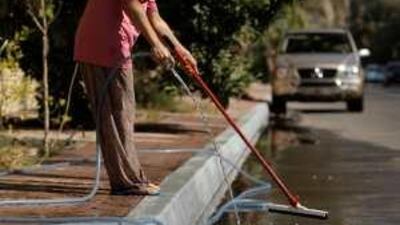A campaign to install water meters across the emirate aims to solve a mystery that has confounded officials for decades: just where does the water go? The question is tougher to answer than it seems, as attempts to measure individual consumption are relatively new in the UAE.
About 80 per cent of customers' supplies are now being metered after a lengthy installation effort that began several years ago, according to the Regulation and Supervision Bureau, and full coverage is expected within one to two years. "We hope to eventually get a complete picture of inputs and outputs," said Nick Carter, director general of the bureau. "What we're trying to do is to get the difference of what is supplied to customers and delivered to wastewater plants reduced."
Only 20 per cent of water supply ends up at wastewater plants after use, suggesting the vast majority goes into the ground. But without meters, officials cannot know for sure what proportion is used for outdoor activities such as car washing and gardening, and how much simply leaks out of the mains. About 70 per cent of potable water is used for irrigation and agriculture, according to the bureau.
It estimates that between 15 per cent and 19 per cent of water leaks from the distribution system, which compares favourably with older water systems such as London's, but could be much lower. The bureau plans to carry out a detailed study of customers and businesses next year. As part of the plan, it will install small meters on taps to assess consumption patterns. Abu Dhabi Distribution Company, which is responsible for delivering power and water in Abu Dhabi and Al Gharbia, puts the total loss rate at 30 per cent, 12 per cent of which are considered "technical losses". These are the company's responsibility because they occur before the water reaches the customer, said Abdulhamid Nassouri, the company's director of asset management.
Mr Nassouri said the company was intent on developing a better understanding of losses. The emirate has already embarked on a number of other initiatives to cut water use and reduce waste of the precious commodity. Groundwater supplies have been depleted by increased demand, while desalination, which provides most of the potable water, is an expensive process. According to the Environment Agency-Abu Dhabi, residents in the emirate use 550 litres of water a day compared with 85 litres in Jordan. The figure for the US is 485 litres. The agency wants to cut consumption by about 37 per cent to 350 litres per person per day.
There is little doubt among experts, however, that water's low price has diminished the incentive to install meters and reduce leakage, and contributed to very high consumption. Water is free for Emiratis, and costs Dh10 per 1,000 gallons (4,55 cubic metres) for expatriates. The RSB has calculated that it would cost Dh30 per 1,000 gallons if the price reflected the full cost of production. "Since you got it basically free or very cheap, there was never a real awareness of the preciousness of water," said Hans Altmann, the regional director for Techem, an international metering and water management company.
Mr Altmann said official water policy was determined in part by Abu Dhabi's production strategy, in which water is bound up with electricity since it is produced from the waste heat of power stations. The process improves efficiencies but can create imbalances in the market because in summer, plants raise production to meet electricity demand and produce a surplus of water, while in winter, they must produce more electricity than needed to meet water demand.
Mr Altmann said the agency should focus on reducing electricity demand to cut water consumption, since the two are connected, and should consider raising prices. But officials note that water prices are a politically contentious subject, and large savings can be achieved even without increasing costs for consumers. A study commissioned by the Executive Affairs Authority found that in the best-case scenario, more efficient irrigation technologies and upgrades to household water taps and toilets and appliances could reduce consumption of metered water by 30 per cent.
cstanton@thenational.ae

